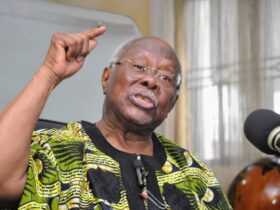
Kashim Shettima, on Friday, attributed the hardship faced by residents in the north-east region of Nigeria to the activities of terrorists.
Shettima expressed optimism that the scourge of terrorism, which has plagued the region for far too long, would be defeated.
Shettima’s speech was read by the Senate President, Godswill Akpabio, at the launch of a book titled ‘Terrorism and Counter-Terrorism in North-East Nigeria: Emerging Perspectives and the Imperative of Airpower’.
He emphasised that peace could be restored to the region if all stakeholders resolved to work together.
READ MORE:Kano Anti-Graft Boss Muhuyi Magaji Arraigned Over Alleged N390m Fraud, Granted Bail
Shettima said, “The North-East region has been grappling with the scourge of terrorism for far too long. The brutal acts committed by extremist groups have inflicted immense suffering upon the innocent people of the region. But amidst this darkness, there is hope. I hope that through knowledge, understanding, and the collective efforts of all stakeholders, we can overcome these challenges and restore peace and stability to the region.”

In addition, Air Marshal Hassan Abubakar, the Chief of Air Staff, stated that the use of air power has assisted in weakening the terrorists. He mentioned that the military had been able to fight the terrorists and undertake intelligence gathering and surveillance.
Abubakar said, “Today, we are glad to highlight the significance of airpower in the fight against terrorism. Airpower, with its unique capabilities and reach, has proven to be a game-changer in countering the asymmetric threats posed by terrorist organisations. The ability to swiftly project force, conduct surveillance, gather intelligence, and provide close air support has been instrumental in degrading the capabilities of these insurgents and terrorists.”
Furthermore, he conceded that combating terrorism was not a one-dimensional endeavour and that a holistic strategy that tackled the underlying roots of extremism, encouraged social cohesion, and supported economic development was needed.
Abubakar continued by saying that policymakers and military strategists may use the viewpoints and insights presented in the book as a reference when developing comprehensive solutions that extend beyond the domain of military operations.







Leave a Reply